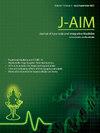Effects of yogic practices on physiological and biochemical parameters of hypertensive patients: A systematic review of clinical trials
IF 1.9
Q3 INTEGRATIVE & COMPLEMENTARY MEDICINE
引用次数: 0
Abstract
Background
Hypertension affects around 1.28 billion adults worldwide. If not managed properly, it can lead to life threatening conditions. While various pharmacological treatments are available, they are associated with various short- and long-term side effects. Hence it is crucial to explore alternative approaches to complement the standard medical interventions. Objective: This systematic review aims to explore the impacts of yogic practices on various physiological and biochemical parameters in hypertensive patients.
Methods
Various electronic databases including PubMed, Cochrane library, Directory of Open Access Journals and Google scholar were systematically searched until October 31, 2023 to collect relevant data.
Results
A total of 15 articles comprising 5 RCTs and 10 clinical trials were identified. The number of participants ranged between 33 and 300, with Yoga intervention lasting from two months to a year. The analyses revealed that Yogic practices, such as loosening practices, Surya Namaskar, Tadasana, Trikonasana, Paschimottanasana, Shavasana. Anulom-Vilom Pranayama, Bhramari Pranayama, meditation and Yoga Nidra, positively influenced physiological and biochemical markers linked to Hypertension such as autonomic nervous system activity, angiotensin II expression, oxidative stress, lipid metabolism, immune system function and inflammatory gene expression.
Conclusion
The findings of this systematic review indicate that the Yoga practices have a positive impact on physiological and biochemical markers associated with hypertension which may help in its proper management and treatment. Future studies need to assess additional markers associated with hypertension, such as vasopressin, adrenocorticotropic hormone, gamma-aminobutyric acid and others to enhance the understanding of the mechanism of the effects of Yoga on hypertension.
Study registration
PROSPERO ID: CRD42024497060.
瑜伽练习对高血压患者生理生化指标的影响:临床试验的系统回顾
背景:全世界约有12.8亿成年人患有高血压。如果处理不当,可能会导致危及生命的情况。虽然有各种各样的药物治疗,但它们都有各种短期和长期的副作用。因此,探索替代方法以补充标准医疗干预措施至关重要。目的:本系统综述旨在探讨瑜伽练习对高血压患者各项生理生化指标的影响。方法系统检索PubMed、Cochrane library、Open Access Journals Directory和谷歌scholar等电子数据库,收集相关数据,截止到2023年10月31日。结果共纳入文献15篇,包括5项随机对照试验和10项临床试验。参与者人数在33到300人之间,瑜伽干预持续时间从两个月到一年不等。分析表明,瑜伽练习,如放松练习、仰卧式、tadas体式、三角式、Paschimottanasana、Shavasana。Anulom-Vilom调息法、Bhramari调息法、冥想和瑜伽法对高血压相关的生理生化指标有积极影响,如自主神经系统活性、血管紧张素II表达、氧化应激、脂质代谢、免疫系统功能和炎症基因表达。结论瑜伽练习对高血压相关生理生化指标有积极影响,有助于高血压的合理管理和治疗。未来的研究需要评估与高血压相关的其他标志物,如抗利尿激素、促肾上腺皮质激素、γ -氨基丁酸等,以加强对瑜伽对高血压作用机制的理解。研究注册号prospero ID: CRD42024497060。
本文章由计算机程序翻译,如有差异,请以英文原文为准。
求助全文
约1分钟内获得全文
求助全文
来源期刊

Journal of Ayurveda and Integrative Medicine
INTEGRATIVE & COMPLEMENTARY MEDICINE-
CiteScore
4.70
自引率
12.50%
发文量
136
审稿时长
30 weeks
 求助内容:
求助内容: 应助结果提醒方式:
应助结果提醒方式:


